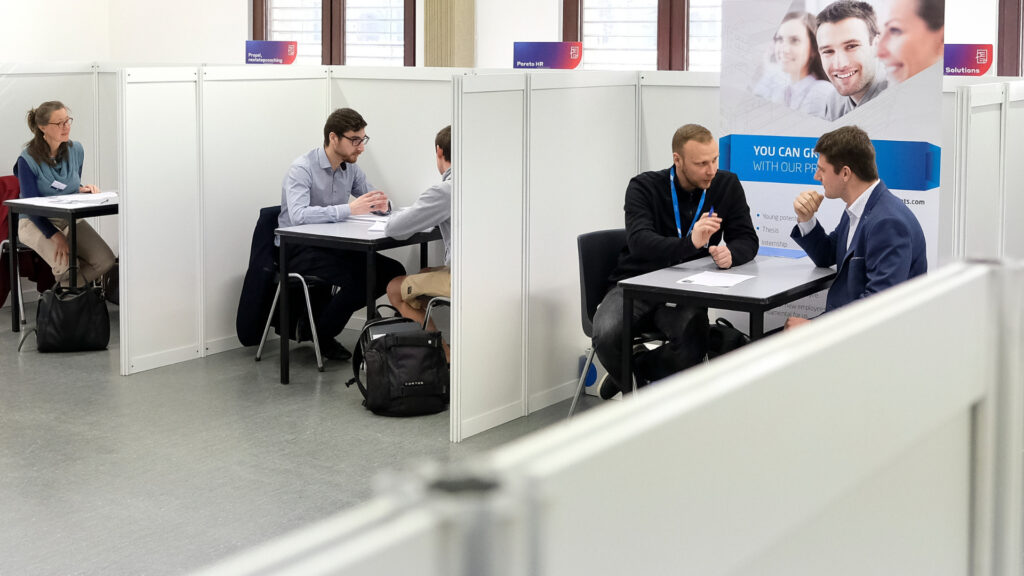Graduation is fast approaching for final-year students, which means it’s almost time to start searching for a job. Our university tries to assist in the search by offering a wide range of tools and initiatives. Here’s an overview.
Young twentysomethings are often still searching for their identity. Who am I? What do I want? Once you have your degree, you are faced with another big challenge: what kind of job do I want and how do I enter the labour market? ‘Especially students from more general fields – such as languages or human sciences – are often unsure about what jobs are available to them and how to start their search’, Sara Backx from the Study Advice and Student Counselling Department says. ‘But even students from, for example, medicine sometimes have questions, such as “how do I apply for a job?” We would like to help those students make conscious career choices so that they are in the right place sooner.’
Career ‘lemniscate’
UAntwerp offers a lot of guidance options, which are designed using the career guidance model elaborated by Professor Marinka Kuijpers. Sara: ‘The model centres around competences needed to guide your career: knowing what you can do, knowing your own interests, networking, selling yourself, exploring the labour market… These competences are presented on a “lemniscate”, the sign for infinity. No coincidence, since mapping out a career is a process that never stops.’

The career lemniscate also forms the basis for an online module on career coaching, which the VLIR has developed in cooperation with VDAB over the past few years and will launch next academic year. It aims to provide tools for lecturers, programme counsellors and other staff who want to advise or supervise final-year students.
Career Centre
A useful tool that students and alumni can use at any time is the Career Centre, a career platform that includes job vacancies and info on job events. Students can create a personal profile, on which they indicate their interests and other information. They can also upload their CV so that companies can contact them directly.
‘One component of the Career Centre is the Get Started module’, Sara explains. ‘Here students will find information to really get started: how to map your talents and interests, how to create a CV, where to find job vacancies, etc. All of this is divided into sections corresponding to competences defined in the career lemniscate. For example, in “Know yourself”, students can find self-tests and questionnaires, while “Sell yourself” has tips on creating a CV and applying for a job.’ To consult specific UAntwerp information, students need to log in using our own student platform.
Career Week
The annual job fair, which was renamed to Career Week and received a complete overhaul, also gives students a boost. The event, with both live and online sessions, lasts a whole week and focuses on the theme ‘talents’. The kick-off was on 1 March in the Stadscampus Sports Hall: it included an interview with radio presenter Sven Ornelis, info sessions, and opportunities to have an informal chat with alumni. Students can have their CV screened and have a professional profile picture taken. ‘We invited Sven Ornelis as a speaker because he chose a career path that was not obvious for his degree in religious studies. By doing so, we highlight that you can go in a wide variety of directions after university, as long as you use your talents in the right way’, Eva Goethals from the Study Advice and Student Counselling Department says.

For the rest of the week, students can watch online videos on, for example, doing a PhD, international internships and using LinkedIn. They can also get in touch with companies online. The event concludes on 8 March with Career Week Online, where students can have one-on-one interviews with companies. ‘Before, there was just one job day where companies were present, so this new concept may be less overwhelming for the students’, Inge Bervoets from the Marketing and Communications Department says. All students and recent graduates will receive an email about the initiative. Inge: ‘We are promoting the event through various channels. There’s also a slide for lecturers, available from their faculty SPOC. They can show that at the beginning of their lessons.’
Guidance from the STIP
Students with questions or doubts about career planning can also contact the STIP, which offers both group sessions and individual counselling. Online information sessions are organised with tips and tricks on how to apply for a job (how to create your CV and cover letter, using LinkedIn, preparing for a job interview, etc). There is also a workshop on applying for a job in which students practice a job interview using role-play. Finally, students can also turn to one of the career guidance coaches for individual counselling. ‘We always try to impart to students that a career rarely goes swimmingly at the start. It’s perfectly normal that your first job does not immediately tick all the boxes of your ideal job’, Talia Gheys from the Study Advice and Student Counselling Department says.

Faculty initiatives
Besides what the central services offer, there are a lot of interesting initiatives from the faculties themselves, such as meet-and-greets with alumni, job days, or job application workshops. Student associations often organise activities as well.
Good to know: all forms of student counselling are still available until September for graduating students. Inge: ‘The Career Centre remains accessible even after graduation. Graduates just need to remember to change their student email address to a private email address. And they are also still invited to Career Week, up to three years after graduation.’
More info?
All information on graduation support can be found on the Pintra page ‘Student Support Info Centre’, under ‘Graduation support’ (info in Dutch). There you will also find information about the career coaching module you can take from next academic year. See also www.uantwerpen.be/careercenter and www.uantwerpen.be/careerweek.


